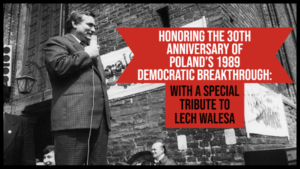Did Central Europe’s democratic forces defeat one form of authoritarianism, but fail to anticipate other threats to freedom?
The post-Cold War disruption in job markets, economic inequities, and disputes over migrant labor across Europe have made it apparent that political, governmental, and economic structures need “remodeling, even democracy,” said former president and Nobel Peace Prize winner Lech Walesa, the Harvard Gazette’s Christina Pazzanese reports.
But the growing absence of the U.S. as a global force in recent years has left a void of ideas and leadership, he told the Harvard Kennedy School on Monday evening.
 The former Solidarity union leader told a National Endowment for Democracy forum (above) that “we defeated communism…but allowed populist demagogues to win elections.” Appearing alongside Walesa, economic reformer Leszek Balcerowicz said democracy requires an independent judiciary and media — institutions that are under pressure in Poland, the Globalist’s Barry Wood writes.
The former Solidarity union leader told a National Endowment for Democracy forum (above) that “we defeated communism…but allowed populist demagogues to win elections.” Appearing alongside Walesa, economic reformer Leszek Balcerowicz said democracy requires an independent judiciary and media — institutions that are under pressure in Poland, the Globalist’s Barry Wood writes.
“Hungary is no longer a democracy,” but at least there are some signs that Orban’s rule isn’t going unchallenged, said Anne Applebaum (above). His candidate in the crucial race for mayor of Budapest lost, facing a united range of opposition parties.
The Carnegie Endowment’s Thomas Carothers considers whether expectations of 1989’s events were too optimistic. What blame can be attached to the political mistakes of the West, and what lessons can be drawn from 1989? he asks in a lecture was as part of a ZOiS event – 1989 Through the Darkened Lens of the Present – on 11 November 2019.







